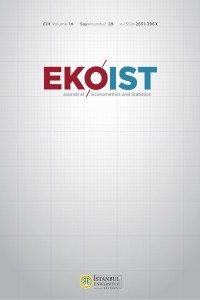Uluslararası Sermaye Akışlarında Ani Duruş: Türkiye Örneği
Ani duruş, Öz kaynak akışları, Borç akışları, Probit Model
A Sudden Stops in International Capital Flows: The Case of Turkey
Sudden Stops, Equity Flows, Debt Flows, Probit Model,
___
- Adas, C.G. ve Kartalli, F.Y. (2016). Sudden Stops and Capital Controls: When to Apply in Turkey. International Journal of Economics and Finance, 8(4), 289-305.
- Calderón, C. ve Kubota, M. (2013). Sudden stops: Are global and local investors alike?, Journal of International Economics, 89,122–142.
- Calvo,G. A., Izquierdo, A. ve Mejía, L-F. (2004). On the empırıcs of sudden stops: the relevance of balance-sheet effects, NBER Workıng Paper Serıes, Working Paper 10520.
- Calvo,G.A., Izquierdo, A. ve Mejia,L-F. (2008). Systemıc sudden stops: The relevance of balance- sheet effects and fınancıal ıntegratıon, NBER Workıng Paper Serıes, Working Paper 14026
- Dağlaroğlu, Demirel ve Varlık. (2013). Bilanço Düzeltme Sürecinde Gelişmekte Olan Piyasa Ekonomilerinde Ani Duruş Problemine Karşı Makro Basiretli Politikalar. Internatıonal Conference On Eurasıan Economies, 579-588.
- Dornbusch, R. Goldfajn, I. Valdés, R.O., Edwards, S. ve Bruno, M. (1995). Currency Crises and Collapses. Brookings Papers on Economic Activity, 1995(2), 219- 293.
- Fendoğlu, S. ve Ongena, S. (2020). Tracing the Impact of a Sudden Stop: The Role of Bank Rollover Risks, Expectations, and Domestic Production Networks, Türkiye Cumhuriyet Merkez Bankası, Working Paper No: 18/18.
- Forbes, K.J ve Warnock, F.E. (2012) Capital flow waves: Surges, stops, flight, and retrenchment. Journal of International Economics, 88 (2012), 235–251.
- Furman, J. Stiglitz, J. E., Bosworth, B.P. ve Radelet, S. (1998) Economic Crises: Evidence and Insights from East Asia. Brookings Papers on Economic Activity, 2, 1-135
- Ghosh, A. R., Qureshi, M. S., Kim, J.I. ve Zalduendo, J. (2014). Surges. Journal of International Economics, 92(2), 266-285.
- Gorton, G.G. (2017). Finansal Krizleri Yanlış Anlamak – Krizlerin Gelişini Neden Göremiyoruz, Kitabın Orijinal Adı: Misunderstanding Financial Crisis - Why We Don’t See Them Coming, Oxford University Press, 2012, Çev:Mehmet Doğan, 1.Basım, Boğaziçi Üniversitesi Yayınevi, İstanbul.
- Gün, M., Kutlu, M. ve Karamustafa, O. (2016). Gezi Parkı Olaylarının Türkiye Kredi Temerrüt Swapları (CDS) Üzerine Etkisi, İşletme Araştırmaları Dergisi, 8/1,556-575.
- İnan, E. A. (2006). Türkiye’de 2002-2005 Döneminde Tasarruf Dengeleri ve Ani Kesinti İhtimali. Bankacılar Dergisi, 59,16-38.
- Koepke, R. ve Paetzold, S. (2020). Capital Flow Data – A Guide for Emprical Analysis and Real- Time Tracking, IMF Working Paper, WP/20/171, This Version: March11.2022.
- Li, S., Jakob, H. ve Scholtens,B. (2018). Sudden stops of international fund flows: Occurrence and magnitude, Wiley, Rev Int Econ., 27, 468–497.
- Özdemir, B.K. ve Öbekcan, M. (2020). The Effects of Sudden Stops on the Turkish Economy: A Structural VAR Approach. Business and Economics Research Journal, 11(2), 307-321.
- Park, J. Y., & Phillips, P. C. (2000). Nonstationary binary choice. Econometrica, 68(5), 1249-1280.
- Perron, P. (1997). Further evidence on breaking trend functions in macroeconomic variables. Journal of econometrics, 80(2), 355-385.
- Radelet, S. ve Sachs, J.D. (1998). The East Asian Financial Crises: Diagnosis, Remedies, Prospects. Brookings Papers on Economic Activity, Vol. 1998, No. 1,1-90.
- Raluca, I ve Witowschi, B. (2010). Theories about the financial crises, Alexandru Ioan Cuza University of Iaşi, Studies and Scientific Researches͘, Economic Edition, 15, 32-37.
- Rodrik, D. & Velasco, A. (1999). Short Term Capital Flows, NBER Working Paper Series, WP No: 7364,1-44.
- Samur, C. (2010). Bir Finansal Kriz Türü Olarak SS Krizi ve 1980 Sonrasında SS Krizi Tecrübeleri, İstanbul Üniversitesi. İktisat Fakültesi Mecmuası, 60(2), 83-133. Blaszkiewicz-Schwartzman, M. ve Öz, S. (2012). External Vulnerabılıty And Crıses: The Role Of Capıtal Flows And Sudden Reversals – The Case Of Turkey, Economıc Research Forum Research Report Series, Yayın No: ERF-RR/12–01, Yayın No: TÜSİAD-T/2012,06;528.
- Turgutlu, E. (2015). Impact Of Sudden Stops And Internatıonal Reserves On Bank Lendıng: Evıdence From Turkey. Hacettepe University Journal of Economics and Administrative Sciences, 33(3), 131-148.
- Varlık, C. (2007). Türkiye Ekonomisinde Sermaye Akımlarındaki Geri Dönüşler ve Ani Durmalar. Ege Akademik Bakış / Ege Academic Review, 7(1), 193–216.
- Varlık, C. (2011) Sermaye Akımlarındaki Ani Durmalar ve Politika Seçenekleri. Akdeniz İ.İ.B.F. Dergisi, (22), 147-177.
- Vogelsang, T. (1993). Unpublished computer program.
- Yılmaz, C. ve Kurt, Ü. (2012). Türkiye Ekonomisinde Küresel Ekonomik Krizin Bir Kriz Türü Olan SS Krizi Kapsamında Değerlendirilmesi, II. Bölgesel Sorunlar ve Türkiye Sempozyumu, 321-330.
- Yiğiteli, N. ve Turan, D. (2018). Ani Duruş Sorunu, Doğrudan Yabancı Yatırımlar ve Savunma Sanayi Özelinde Bir Değerlendirme, Bulletin of Economic Theory and Analysis Volume III, Issue 2, 79-108.
- Yayın Aralığı: Yılda 2 Sayı
- Yayıncı: İstanbul Üniversitesi
Global Uncertainty and Exchange Rate Volatility
Seda KARAKAŞ GEYİK, Mehmet Hakan SATMAN, Gülin KALYONCU
Nazan ŞAK, Hatice Gökçen ÖCAL ÖZKAYA
Türkiye’de Gıda Fiyatları, Döviz Kuru ve Petrol Fiyatları Arasındaki Asimetrik Ilişki
Hüseyin İÇEN, Nimet Melis ESENYEL İÇEN, Buğra POLAT
OECD Ülkelerinde Demokrasinin Çevresel Bozulma Üzerindeki Etkisi
Finansal Zaman Serileri Tahmininde Hibrit Yaklaşımlar: Bir Hisse Senedi Piyasası Uygulaması
